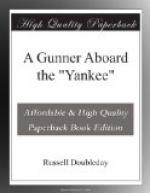Imagine in the centre of one of these groups a wicked, menacing gun—a five-inch breechloader, its long, lean barrel raised shoulder-high upon the apex of a conical gun-mount, near the base of which are significant wooden cases, some empty and others filled with elongated, formidable cartridges; and pails of black, dirty water ascum with powder; and other objects each significant of war.
Imagine these things, and then understand that this gun, made to be turned against an enemy, has now turned against its workers. In the bore, pent in by the polished breechblock, is a cartridge which has failed in its duty. It is apparently defective.
The tide of battle is surging on; other ships of the bombarding fleet are still pouring their shot and shell upon the grim array of forts ashore; other guns of this ship are pursuing their duty with savage energy. But this gun is silent.
The men wax impatient. It is the height of the conflict. Many shots have been fired, and many more will yet be required to subdue the enemy. To be “out of action” will mean passiveness in the face of the enemy. Anything but that.
There is a rivalry between the guns’ crews. It is a rivalry as to which shall make the best shots and create the most damage. The members of Number Eight—the after gun on the port side—are proud of their record. Their second captain—he whom they call “Hay”—has received the public commendation of the captain himself, sent down from the bridge in the midst of the battle. It is a mark of distinction not given freely, and Number Eight is eager for more honors.
But the men have not forgotten a similar case, occurring on the voyage down the coast, when another cartridge failed, and on being extracted from the breech chamber, exploded, killing a marine corporal and wounding others.
The men of Number Eight have not forgotten that tragedy, and that is why their gun is now to them a menacing creature of steel, whose breath may be the breath of death. They stand in groups, they eye it, they speculate, and they feel that a desperate and perilous duty is before them.
The risk must be taken. The cartridge must be extracted. It is a fortune of war which all who enlist must expect. But it is one thing to fall before an enemy’s blow, and another to lose your life at the stroke of your own weapon.
The officer of the division steps forward.
“We will see if we can’t take it out without much danger,” he says, briefly. “Bring a rope.”
One is hastily procured, and the first captain—a great, brawny, good-natured fellow, who has spent years at sea—deftly fastens the bight of the rope to the handle of the breechblock. He then retreats a short distance and signifies his readiness.
“When I give the word,” calls out the officer, “pull handsomely. Ready—pull away!”
From out the smoke-filled compartment men lean forward, eagerly—anxiously. They instinctively shrink back as the breech plug slowly moves. Then, when it finally opens, revealing the brass head of the cartridge inside the firing chamber, a sigh of relief comes from all.




